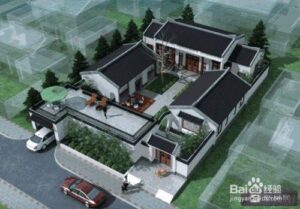UNIT 1 第一单元
2. 四合院的优点
AUTHENTIC MATERIALS
四合院的优点
四合院有什么好处?以前的人为什么要这样建?[1]
四合院至少有以下5个优点:

一、单层建筑接地气
古代中国没有人口压力和土地的限制,传统四合院都是单层的。以前的中国人选择居住在地面上,接地气,对身体健康有益。
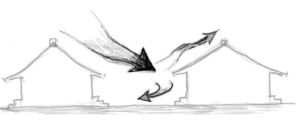
二、坡屋顶让自然风进入院内
当时的房屋结构叫做“坡屋顶,” 坡屋顶让自然风向下进入院子内部(=里),一部分沿另一个坡屋顶向上走,一部分则进入院子内部(=里)。
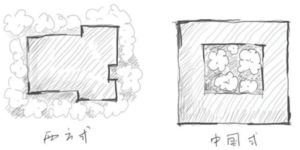
三、建筑和庭院良好的围合关系
西方的建筑一般在土地中间建一栋独立的房子,周围是院子。中国刚好相反,是在土地周围建房子,而院子在中间,是典型的庭院式建筑。这是两种文化、两种思维方式的差别,各有所长,并无优劣之分。
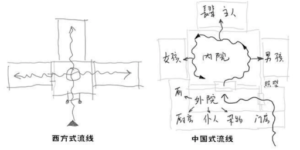
四、房间的等级和空间的递进层次
四合院的设计遵循许多“规则”,主要的流线从外到内,从低到高,体现男尊女卑,长幼有序、主仆地位的思想。
西方的建筑设计规则很少,主要的流线是从外到内,家庭成员之间的差别和空间的递进层次是没有关系的,只体现主卧室和次卧室面积大小的差异。中西建筑有不同的流线关系。
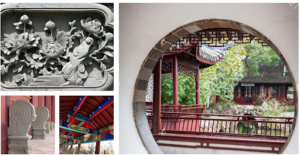
五、精美的艺术装饰
传统四合院古香古色,有许多艺术装饰,都是宝贵的文化遗产。老北京四合院中有各式各样的艺术装饰,比如像砖雕、石刻、木器、琉璃制品和彩绘等,各种装饰都有深刻的文化象征寓意。
现代四合院与传统四合院的比较[2]
四合院有什么好处?词汇表 Vocabulary
| Vocabulary | Pinyin | English Meaning |
| 接地气 | jiē dì qì | literally means to be connected with the breath from the earth; now extended to indicate someone is “down to earth” |
| 限制 | xiàn zhì | restriction, limit |
| 坡屋顶 | pō wū dǐng | sloped roof |
| 沿 | yán | along with |
| 典型 | diǎn xíng | typical |
| 思维方式 | sī wéi fāng shì | way of thinking |
| 各有所长 | gè yǒu suǒ cháng | each has its own strength |
| 优劣之分 | yōu liè zhī fēn | difference between good and bad |
| 等级 | děng jí | grade; social status |
| 层次 | céng cì | level; stage; layer |
| 遵循 | zūn xún | to follow; to abide by; to adhere to |
| 规则 | guī zé | rule, regulation |
| 流线 | liú xiàn | streamlined |
| 男尊女卑 | nán zūn nǚ bēi | to regard men as superior to women (lit. ‘men honored and women debased’) |
| 长幼有序 | zhǎng yòu yǒu xù | There are hierarchical orders between the younger and the elder (the elder are more respected) |
| 主仆 | zhǔ pú | master and servant |
| 古色古香 | gǔ sè gǔ xiāng | quaint; having an antique vibe |
| 宝贵 | bǎo guì | valuable, precious |
| 文化遗产 | wén huà yí chǎn | cultural heritage; cultural legacies |
Grammar Structures
1.对……有益 v. phrase be beneficial to
e.g. 住在四合院里对身体健康有益。
2.沿……向……走 v. phrase (sth. )+沿(着)+(place)+向+(direction)+走
e.g. 风沿(着)坡屋顶向上走。
我沿(着)马路向前走。
3. structure 1: 体现…… v. to show; to indicate
e.g. 四合院的设计体现了长幼有序的思想。
structure 2: 体现在+(aspect) 中 v. phrase to be indicated in a certain aspect
e.g. 长幼有序的思想体现在四合院的设计中。
PRE-TASKS
Pre-task 2:选出我们要住的四合院
上课以前,请同学们看一看爱彼迎(Airbnb)中三套四合院的介绍。
三套四合院介绍如下:
想一想,你会想租哪一套四合院?为什么?请从下面几个方面比较三套四合院的利弊,选出你最喜欢的一套,上课的时候和同学们讨论。Please type keywords or phases in each cell. NO need to come up with complete sentences.
CORE-TASKS
Core-task 1 四合院有什么优点?
Core-task 2 选出我们要住的四合院
问题讨论之后,请同学们再看一看爱彼迎(Airbnb)中三套四合院的介绍,想一想,现在会想租哪一套四合院?为什么?请再从下面几个方面比较三套四合院的利弊,选出最喜欢的一套,上课的时候和同学们讨论。Please type keywords or phrases in each cell. NO need to come up with complete sentences.
POST-TASK
Part I: 手写汉字 Handwritten Characters
Please handwrite the characters that are highlighted in yellow at least 5 times. 每个汉字至少写5次 Feel free to write additional characters that you feel necessary and interesting.

PART II: 手写短文Handwritten Self-composed Short Essay
TOPIC: 介绍我们在北京住的四合院
今天上课的时候,我们讨论了四合院的优点,看了三个四合院的设计与建筑特色,分组讨论, 一起决定了一个最理想的四合院,这就是我们在北京要住的地方! Use the above characters highlighted in yellow (as many as possible) and the following grammatical structures to handwrite a short self-composed essay at a minimum of 120 characters. Keep the following guided questions in mind to organize your thoughts.
Grammar Structures
1.对……有益 v. phrase be beneficial to
e.g. 住在四合院里对身体健康有益。
2. structure 1: 体现…… v. to show; to indicate
e.g. 四合院的设计体现了长幼有序的思想。
structure 2: 体现在+(aspect) 中 v. phrase to be indicated in a certain aspect
e.g. 长幼有序的思想体现在四合院的设计中。
Guided Questions
-
- 你们选择了哪一个四合院?这个四合院体现了哪些传统四合院的优点?与美国公寓或房子相比,在哪一方面的差异/差别最大?请写出一点最大的差异/差别,并说明理由(lǐ yóu=reason)。
- 为什么选择了这个四合院? 请写出你们考虑的标准(3-4方面),并说明理由(lǐ yóu = reasons)。
- 下周一到北京以后,就要住在你们自己选的四合院了,心情怎么样?用一、两个句子形容(xíng róng = describe) 你的心情。
| 传统单层四合院 | 现代单层四合院 | 现代双层四合院 | |
| 楼层(几层?有没有阁楼?) | |||
| 空间(大不大?是不是充分利用空间来设计?) | |||
| 庭院(是否有独立的小院?) | |||
| 卧室(是否注重隐私?是否舒适?) | |||
| 厨房/卫生间(通风怎么样?是否明亮干净?) | |||
| 采光(屋内是否明亮,通风?) | |||
| 装饰(注重传统形式还是现代形式?) | |||
| 地理位置(周边是否便利?都有哪些设施?) | |||
| 价格(是否合理?) |
jiē dì qì
literally means to be connected with the breath from the earth; now extended to indicate someone is “down to earth”
xiàn zhì
restriction, limit
pō wū dǐng sloped roof
yán
along with
diǎn xíng
typical
sī wéi fāng shì
way of thinking
gè yǒu suǒ cháng
each has its own strength
yōu liè zhī fēn
difference between good and bad
děng jí grade; social status
céng cì
level; stage; layer
zūn xún to follow; to abide by; to adhere to
guī zé
rule, regulation
liú xiàn
streamlined
nán zūn nǚ bēi
to regard men as superior to women (lit. ‘men honored and women debased’)
zhǎng yòu yǒu xù
There are hierarchical orders between the younger and the elder (the elder are more respected)
zhǔ pú
master and servant
gǔ sè gǔ xiāng
quaint; having an antique vibe
bǎo guì
valuable, precious
wén huà yí chǎn
cultural heritage; cultural legacies


